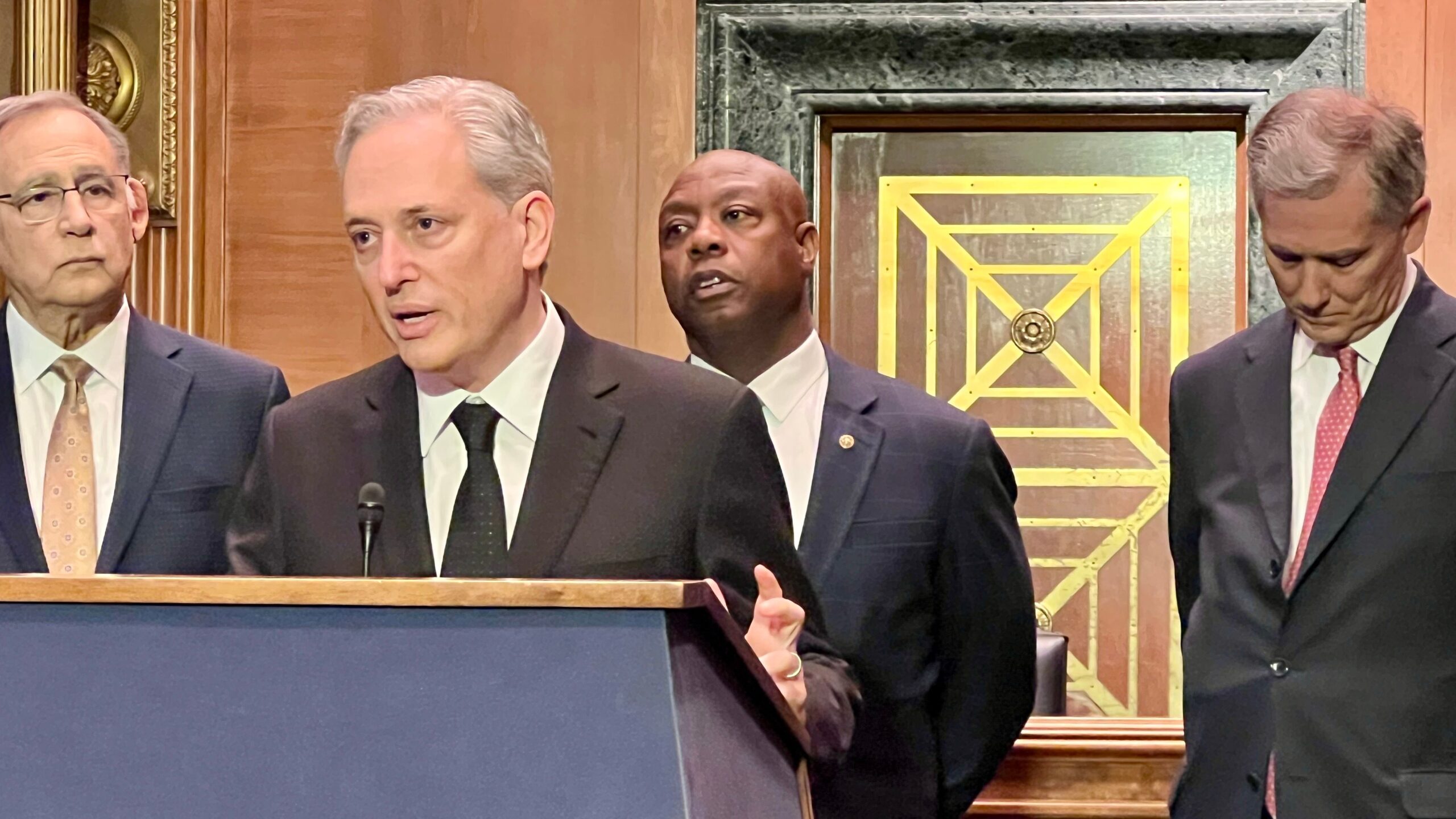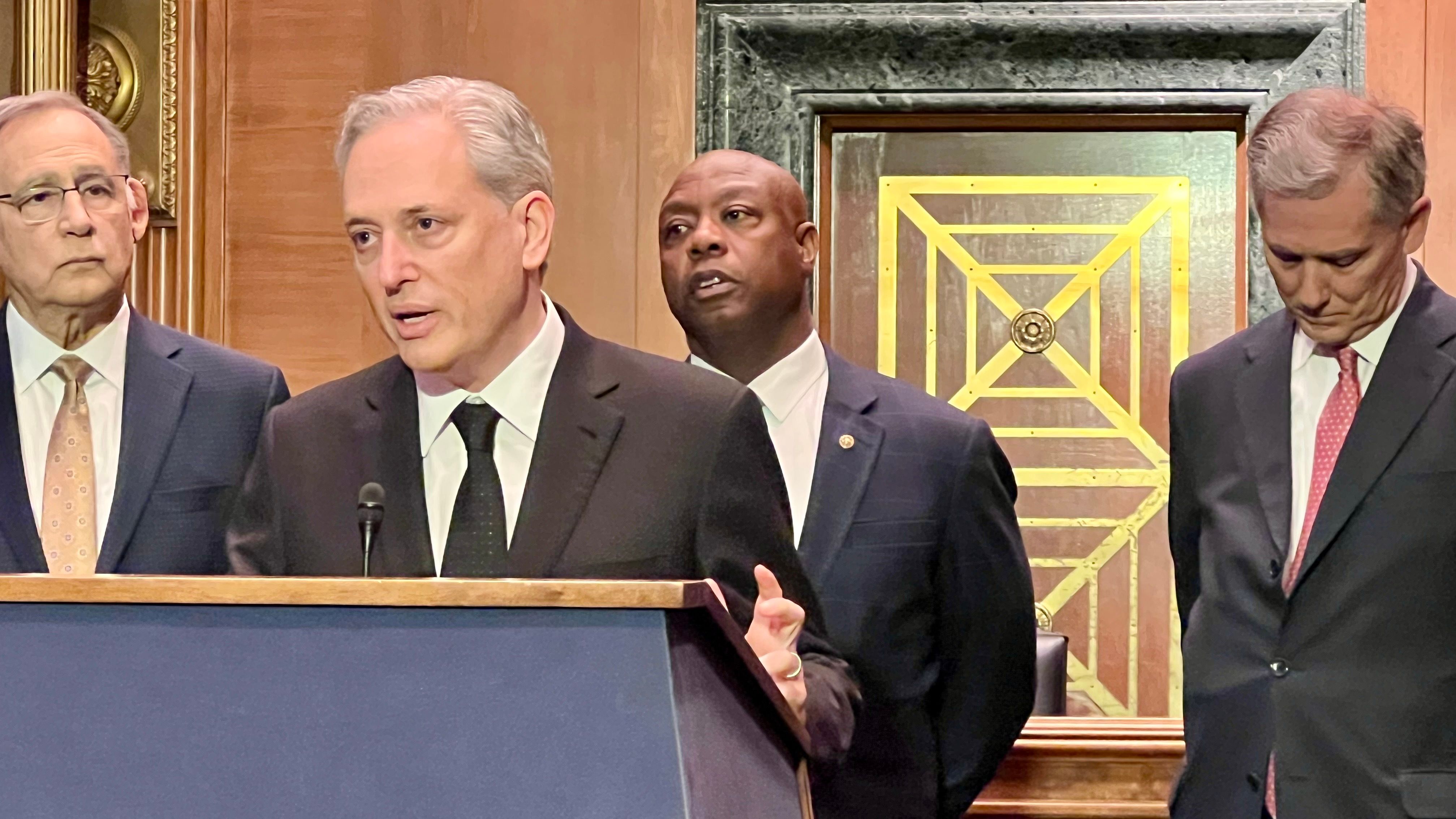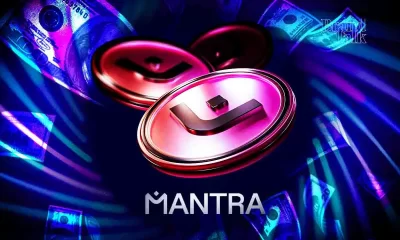policy
David Sacks Quietly Divested From Crypto Company at Center of Conflict of Interest Controversy
Published
1 month agoon
By
admin

David Sacks, President Donald Trump’s crypto and artificial intelligence czar, came under fire this week following allegations that he could financially benefit from Trump’s announcement of a U.S. strategic crypto reserve.
The initiative, which Trump shared details about on Sunday, would involve the government holding a reserve of digital assets, including Bitcoin (BTC), Ethereum (ETH), XRP, Cardano (ADA), and Solana (SOL). Critics raised concerns that individuals within the administration with ties to these assets could stand to gain from the move.
Sacks, a venture capitalist with previous crypto investments, quickly became a focal point of the controversy. Over the weekend and into Monday, he responded on X (formerly Twitter), rejecting accusations that he had a financial interest in the policy. He stated that he had divested from all of his personal crypto-related holdings before joining the administration, including his stake in Multicoin Capital, a crypto-focused investment firm.
One lingering question, however, was whether Craft Ventures — Sacks’ venture capital firm — had retained its investment in Bitwise, a crypto index fund manager that Sacks helped fund back in 2017. Bitwise’s investment products include an ETF that holds all the assets mentioned in Trump’s strategic reserve plan, raising concerns that it could benefit from the government’s crypto purchases.
On Tuesday, a source close to Craft Ventures confirmed to CoinDesk that the fund exited its position into Bitwise prior to the start of the President’s second administration. The Craft Ventures website was also updated on Tuesday to reflect that it had exited its Bitwise investment in January 2025.
Craft Ventures, Bitwise and Sacks have yet to comment publicly on the apparent exit. The source close to Craft Ventures told CoinDesk that the firm has not commented publicly so as not to disrupt Sacks’ government clearance process, which is currently ongoing.
In his social media defense, Sacks dismissed the entire controversy. “The accusation that people who are already very successful in business go into government to make more money is a lazy and stupid narrative,” he wrote. “As I’ve learned, serving in government involves substantial disruption and divestiture of one’s business interests.”
The debate over Trump’s proposed reserve continues to divide the crypto community. Some of the president’s crypto supporters argue that a Bitcoin-only reserve would be preferable, while others question whether the government should be involved in digital asset holdings at all — arguing that government intervention in the crypto space contradicts the industry’s decentralized ideals.
Conflict of interest questions also continue to swirl around the president, himself. The Trump-backed crypto startup World Liberty Financial has a treasury of around $500 million worth of crypto assets, including some listed in his Sunday reserve announcement.
Source link
You may like


Fartcoin ‘Hot Air Rises’ — $1.50 Just A Whiff Away


What happened to the RWA token?


Crypto Strategist Sees Solana-Based Memecoin Surging Higher, Says One AI Altcoin Flashing Strong Chart


Mantra Team Responds As The OM Token Price Crashes Over 80% In 24 Hours


This Week in Crypto Games: Gaming Tokens Crash Out, Eve Frontier Opens Up


Commerce Secretary Lutnick walks back tariff relief on electronics
Binance
SEC, Binance Ask Judge to Extend Pause in Ongoing Case
Published
2 days agoon
April 12, 2025By
admin
Attorneys for the U.S. Securities and Exchange Commission and Binance asked a federal judge on Friday to continue a pause in the regulator’s case against the crypto exchange for another two months, citing “productive discussions.”
The SEC sued Binance in 2023, alleging the exchange — alongside its U.S. affiliate and executives such as former CEO Changpeng Zhao — violated federal securities laws by operating as an unlicensed clearing agency, broker and exchange. The SEC also alleged commingling and that Binance.US’s trading volume was manipulated. In February, after U.S. President Donald Trump retook office and appointed Commissioner Mark Uyeda as acting agency chair, the regulator asked for a 60-day pause in the case, which was set to expire on Monday. The SEC pointed to a newly created crypto task force aiming to draft clearer guidance around how securities law might apply to digital assets as part of its explanation for the requested pause.
In Friday’s filing, the attorneys involved said the discussions included “how the efforts of the crypto task force may impact the SEC’s claims,” and requested another 60 days’ pause.
“In light of these continued discussions and the time required for the staff to seek authorization from the Commission as necessary to approve any resolution or changes to the scope of this litigation, the SEC requested that the Defendants agree to continue the current stay for an additional 60 days, and the Defendants agreed that continuing the stay is appropriate and in the interest of judicial economy,” the filing said.
Source link
Barry Silbert
Judge Rules Against Most of DCG’s Motion to Dismiss NYAG’s Civil Securities Fraud Suit
Published
2 days agoon
April 12, 2025By
admin
A New York judge ruled Friday that the majority of New York Attorney General Letitia James’ civil securities fraud suit against crypto venture firm Digital Currency Group (DCG) and two of its executives can proceed to trial.
In 2023, James sued James sued DCG and its CEO Barry Silbert, DCG’s now-bankrupt lending arm Genesis Global Capital and its former CEO Michael Moro and crypto exchange Gemini, alleging that they worked together to cover up a gaping $1 billion hole in Genesis’ balance sheet caused by the wipe-out of Singapore-based crypto hedge fund Three Arrows Capital (3AC) in 2022.
James said DCG and Genesis made “false assurances” on social media that DCG had absorbed Genesis’ losses from 3AC’s implosion when, in fact, they had just papered over the hole with a promissory note, pleading to pay Genesis $1.1 billion over 10 years at a 1% interest rate. While DCG has adamantly maintained that the promissory note was legitimate, James’ suit claimed that DCG has “never made a single payment under the Note.”
While Gemini and Genesis both settled with the OAG, DCG, Silbert and Moro have fought them tooth and nail. Last spring, DCG and both executives filed motions to dismiss the suit, alleging that the Office of the Attorney General (OAG) had failed to state a claim — essentially arguing that they were not selling securities and thus should not be sued under New York State securities laws.
But the judge presiding over the case disagreed in her Friday ruling, writing that the OAG had, at least at the current stage of the case, adequately alleged that the Gemini Earn program — the now-defunct Gemini lending product that went belly-up in November 2022 and which sits at the center of James’ case — was a security.
Crane did, however, agree to toss out two of James’ claims against DCG, Moro and Silbert — one claim under New York’s Executive Law that they engaged in a scheme to defraud in the first degree, and another that they engaged in a conspiracy in the fifth degree — ruling that those claims were duplicative.
Though Crane ruled the case can proceed, DCG said it isn’t done fighting.
“As we have stated from the beginning, the allegations against DCG are a thin web of innuendo, mischaracterizations, and unsupported conclusions,” a spokesperson for DCG told CoinDesk. “We’re encouraged by the judge’s dismissal of the New York Attorney General’s most outrageous claims based on alleged violations of criminal fraud and conspiracy statutes. We will continue to fight this baseless lawsuit as we remain focused on our mission in support of the digital assets industry.”
Source link
DoJ
Senate Dems Slam DOJ’s Decision to Axe Crypto Unit as a ‘Free Pass’ For Criminals
Published
3 days agoon
April 11, 2025By
admin
U.S. Deputy Attorney General Todd Blanche is under fire from Senate Democrats following his recent decision to narrow the Department of Justice’s (DOJ) crypto enforcement priorities and disband its crypto enforcement squad.
In a Thursday letter to Blanche, six Senate Democrats — Sens. Mazie Hirono (D-Hawaii), Elizabeth Warren (D-Mass.), Dick Durbin (D-Ill.), Sheldon Whitehouse (D-R.I), Chris Coons (D-Del.) and Richard Blumenthal (D-Conn.) — blasted his decision to cut the National Cryptocurrency Enforcement Team (NCET) as “giv[ing] a free pass to cryptocurrency money launderers.”
The Senators called Blanche’s directive that DOJ staff no longer pursue cases against crypto exchanges, mixers or offline wallets “for the acts of their end users” or bring criminal charges for regulatory violations in cases involving crypto, including violations of the Bank Secrecy Act (BSA), “nonsensical.”
“By abdicating DOJ’s responsibility to enforce federal criminal law when violations involve digital assets, you are suggesting that virtual currency exchanges, mixers, and other entities dealing in digital assets need not fulfill their [anti-money laundering/countering the financing of terrorism] obligations, creating a systemic vulnerability in the digital assets sector,” the lawmakers wrote. “Drug traffickers, terrorists, fraudsters, and adversaries will exploit this vulnerability on a large scale.”
In his memo to DOJ staff on Monday evening, Blanche cited U.S. President Donald Trump’s January executive order on crypto, which promised to bring regulatory clarity to the crypto industry, as the reason for his decision.
“The Department of Justice is not a digital assets regulator,” Blanche wrote, adding that the agency will “no longer pursue litigation or enforcement actions that have the effect of superimposing regulatory frameworks on digital assets while President Trump’s actual regulators do this work outside the punitive criminal justice framework.”
Instead, Blanche urged DOJ staff to focus their enforcement efforts on prosecuting criminals who use “victimize digital asset investors” or those who use crypto in the furtherance of other criminal schemes, like organized crime, gang financing, and terrorism.
Read more: DOJ Axes Crypto Unit As Trump’s Regulatory Pullback Continues
For the Senate Democrats, however, Blanche’s claim doesn’t quite cut the mustard.
“You claim in your memo that DOJ will continue to prosecute those who use cryptocurrencies to perpetrate crimes. But allowing the entities that enable these crimes — such as cryptocurrency kiosk operators — to operate outside the federal regulatory framework without fear of prosecution will only result in more Americans being exploited,” the lawmakers wrote.
The lawmakers urged Blanche to reconsider his decision to dismantle NCET, calling it a “critical resource for state and local law enforcement who often lack the technical knowledge and skill to investigate cryptocurrency related crimes.”
New York Attorney General Letitia James raised similar concerns in her own letter to Congress on Thursday, urging lawmakers to pass federal legislation to regulate the crypto markets. Though her letter itself made no mention of Blanche’s memo or the shuttering of NCET, a press release from her office highlighted that her letter “comes after the [DOJ] announced the dismantling of federal criminal cryptocurrency fraud enforcement, making a robust regulatory framework all the more critical.”
Source link

Fartcoin ‘Hot Air Rises’ — $1.50 Just A Whiff Away

What happened to the RWA token?

Crypto Strategist Sees Solana-Based Memecoin Surging Higher, Says One AI Altcoin Flashing Strong Chart

Mantra Team Responds As The OM Token Price Crashes Over 80% In 24 Hours

This Week in Crypto Games: Gaming Tokens Crash Out, Eve Frontier Opens Up

Commerce Secretary Lutnick walks back tariff relief on electronics

Gold ETF Inflows Hit Three-Year High as PAXG, XAUT Outperform Wider Crypto Market

Israel’s New Study Shows 51% Of Public Is Interested In Adopting CBDC (Digital Shekel) – Is That So?

Solana Price Eyes Breakout Toward $143 As Inverse Head & Shoulders Pattern Takes Shape On 4-hour Chart

Crypto malware silently steals ETH, XRP, SOL from wallets

Binance Executives Met With US Government Officials To Discuss Easing of Regulatory Supervision: Report

Michael Saylor Hints At Another MicroStrategy Bitcoin Purchase, BTC Price To Rally?

From the Crypto Trenches to the Hill: Why Solana Is Making a Big Push in Washington

Bitcoin price tags $86K as Trump tariff relief boosts breakout odds

Where Top VCs Think Crypto x AI Is Headed Next

Arthur Hayes, Murad’s Prediction For Meme Coins, AI & DeFi Coins For 2025

Expert Sees Bitcoin Dipping To $50K While Bullish Signs Persist

Aptos Leverages Chainlink To Enhance Scalability and Data Access

Bitcoin Could Rally to $80,000 on the Eve of US Elections

Crypto’s Big Trump Gamble Is Risky

Sonic Now ‘Golden Standard’ of Layer-2s After Scaling Transactions to 16,000+ per Second, Says Andre Cronje

Institutional Investors Go All In on Crypto as 57% Plan to Boost Allocations as Bull Run Heats Up, Sygnum Survey Reveals

Ripple-SEC Case Ends, But These 3 Rivals Could Jump 500x

Has The Bitcoin Price Already Peaked?

A16z-backed Espresso announces mainnet launch of core product

The Future of Bitcoin: Scaling, Institutional Adoption, and Strategic Reserves with Rich Rines

3 Voting Polls Show Why Ripple’s XRP Price Could Hit $10 Soon

Xmas Altcoin Rally Insights by BNM Agent I

Blockchain groups challenge new broker reporting rule

I’m Grateful for Trump’s Embrace of Bitcoin
Trending

 24/7 Cryptocurrency News5 months ago
24/7 Cryptocurrency News5 months agoArthur Hayes, Murad’s Prediction For Meme Coins, AI & DeFi Coins For 2025

 Bitcoin3 months ago
Bitcoin3 months agoExpert Sees Bitcoin Dipping To $50K While Bullish Signs Persist

 24/7 Cryptocurrency News3 months ago
24/7 Cryptocurrency News3 months agoAptos Leverages Chainlink To Enhance Scalability and Data Access

 Bitcoin5 months ago
Bitcoin5 months agoBitcoin Could Rally to $80,000 on the Eve of US Elections

 Opinion5 months ago
Opinion5 months agoCrypto’s Big Trump Gamble Is Risky

 Altcoins2 months ago
Altcoins2 months agoSonic Now ‘Golden Standard’ of Layer-2s After Scaling Transactions to 16,000+ per Second, Says Andre Cronje

 Bitcoin5 months ago
Bitcoin5 months agoInstitutional Investors Go All In on Crypto as 57% Plan to Boost Allocations as Bull Run Heats Up, Sygnum Survey Reveals

 Price analysis5 months ago
Price analysis5 months agoRipple-SEC Case Ends, But These 3 Rivals Could Jump 500x


